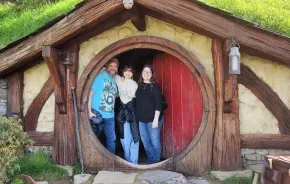
Editor's note: These resources are available at anytime!
Now’s your chance to be a wildlife conservationist — and you don’t even have to leave home! The 50th anniversary of Earth Day is on April 22, and this year, Earth Day’s gone digital. With more people at home than ever before, Woodland Park Zoo’s Wildlife Conservation staff invite you to join them with these activities you can do from your home, a.k.a. Sofa Science!
-
Watch that window! Report sightings of urban carnivores on Carnivore Spotter. Woodland Park Zoo and Seattle University’s Seattle Urban Carnivore Project explores how animals like coyotes, foxes, raccoons, bobcats, and even bears and cougars live and interact with people across the Seattle region. Now that you may be noticing more wildlife in your own neighborhood, please visit carnivorespotter.org to record your local carnivore sightings, and check out other sightings throughout Seattle!
-
Help Woodland Park Zoo’s conservation scientists with their research! It’s easy — just check out different camera trap photos on the Zooniverse platform, and identify the wildlife pictured in them. Your answers help advance the Seattle Urban Carnivore Project and Washington Wolverine Project. Head to www.zooniverse.org/
projects/emammal/emammal to get started.
-
Join the City Nature Challenge! Start adding your observations of wild plants and animals around your home on the iNaturalist app, an online hub for tracking biodiversity around the world. You can support this effort by being an observer, helping others identify their observations, or better yet — both! City Nature Challenge runs from Friday, April 24 – Monday, April 27, 2020. Start here: www.zoo.org/
conservation/naturechallenge
-
Search for butterflies! Look for and report your observations of butterflies for the Western Monarch Mystery Challenge, a community science campaign running through April 22. Led by researchers from Washington State University, Tufts University, UC Santa Cruz and the Xerces Society, this effort is designed to help learn more about monarchs to aid urgent conservation efforts. If you see a monarch butterfly anywhere in Washington, take a photo and post it to iNaturalist to help out this project!
-
Discover local birds! Use the Merlin Bird app to learn how to identify birds in your own yard or neighborhood. Then, jump in to one of these projects with bird researchers in dry ecosystems across the West. Check out Grouse Grooves and Wildwatch Burrowing Owl on Zooniverse. Woodland Park Zoo works with other bird researchers in the shrub steppe habitats of eastern Washington to better understand and protect magnificent birds such as golden eagles, rough-legged hawks and short-eared owls.
-
Explore the world! On iNaturalist, you can virtually explore some of the wild places that Woodland Park Zoo and its partners help to protect, as well as observations of wild plants and animals on zoo grounds!
-
Taman Negara, Malaysia – project site for Malayan Tiger Project
-
Ruaha National Park, Tanzania – project site for Ruaha Carnivore Project
-
Tarangire National Park, Tanzania – project site for Tarangire Elephant Project
Every day is Earth Day, and you can join the global movement for a healthier, more sustainable future for all at any time. To learn more about Earth Day 2020, visit www.earthday.org/.






